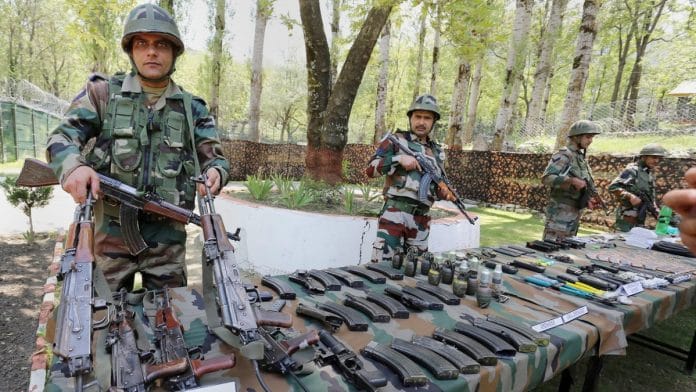Lt Gen Syed Ata Hasnain (Retd) says a positive outcome of the freeze in anti-militancy operations had been the fall in the number of stone-throwing incidents in Kashmir. Tourism too is on the rise.
New Delhi: The promise of peace spelt by the Centre’s Ramzan ceasefire seemed to crumble this Sunday as an attack by militants at an Army camp in Kakapora, in the Valley’s restive south, left a soldier and a civilian dead.
As an IED blast injured three soldiers in Shopian Monday morning, questions began to be raised about the efficacy of the break in anti-militant operations, but experts have urged patience, saying it was too soon to judge the ceasefire.
Speaking to The Print, the Centre’s special representative to Kashmir, Dineshwar Sharma, said at least a month was needed to assess whether a ceasefire had paved the way for peace.
“Sometimes, I compare Kashmir with a sick person. You cannot expect that one medicine will work and effect a full recovery,” he said.
“Even after an initiative like a ceasefire, militancy-related incidents can happen but we cannot judge the situation (just yet). We should wait for the month of Ramzan (to pass) and then make an assessment,” Sharma added.
Lieutenant General Syed Ata Hasnain (Retd), a former commander of the Srinagar-based 15 Corps, said he was “very open to the ceasefire”, primarily because there was “a need to cool down”.
“The non-initiation of combat operations (NICO, how the Army refers to the ceasefire) has been spurned by the Lashkar-e-Tayyeba, with a vague response from the Hizbul Mujahiddeen and the Hurriyat, more in the negative,” he said. “But it is a measure designed primarily to cool down the security environment, allow the public to observe the rituals associated with Ramzan, create goodwill and hopefully bring a reduction (if not an end) to the unabated violence that has afflicted Kashmir since the neutralisation of Burhan Wani.”
Wani, a Hizbul commander credited with giving the militancy a social media presence, was killed in July 2016, spurring a violent season of unrest in the Valley.
The region has struggled to return to normalcy since, with persistent stone-pelting attacks on the armed forces by locals, which reportedly often serve as a ploy to help militants escape.
The ceasefire, announced by the Modi government on 16 May, itself followed a particularly tense time for Kashmir, where April began with three encounters that led to the death of over 12 militants as well as three Armymen and four civilians, with more than 100 people injured in the ensuing clashes.
Earlier this month, a tourist was killed in stone-pelting, with two instances of alleged attacks on school students reported since April.
‘The positive side’
Hasnain said a clear positive outcome of the freeze in anti-militancy operations had been the “fall in the number of stone-throwing incidents in Kashmir”, adding that tourism was picking up as well.
“Ground reports do indicate a relatively calmer environment,” he added, “The real success of NICO will be evident if conditions permit its extension through the duration of the Amarnath Yatra. That is something the authorities must work upon through effective communication and outreach to the people.”
National Conference spokesman Tanvir Sadiq said the ceasefire should continue till people were assured a sincere effort was being made for peace. “There are forces who will try to derail this but we don’t have to be deterred by them. I think anger has come down and we still believe that an iron first is not the solution in the Valley,” he told ThePrint, adding, “But a political solution could pave the way.”
“With this proposal,” Sadiq said, “at least the tempers will come down and people will heave a sigh of relief.” The casualties, he said, were occurring because “anger was forcing people out on the roads”.
Asked about the recent attacks, Sadiq said it would be wrong to say the ceasefire put the security forces on a weaker footing. “If anybody attacks the Army, they are well in form to retaliate. The only fact is that they will not initiate (operations),” he said, hailing the Modi government for the ceasefire initiative.
It was an argument Lt Gen Hasnain echoed. “The Army and the other security forces are maintaining their vigil and domination, having only ceased to execute cordon-and-search operations and search-and-destroy operations,” he added.






